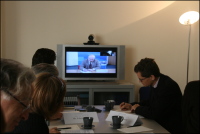Registration
You will receive an email confirming your registration.
IMGXYZ987IMGZYX
The Russia-Georgia conflict has not only re-defined the balance of power in the Caucasus but also Russia’s relations with the world. To understand what a re-emergent Russia wants, Carnegie Europe has hosted the first of its new ‘Live from…’ video briefing with leading Russian foreign policy expert, Dmitri Trenin, Senior Associate and Deputy Director of the Carnegie Moscow Centre. The 50-minute briefing was moderated by Fabrice Pothier, Director of Carnegie Europe, and David Rennie, Correspondent for The Economist acted as the European respondent.
Strategic Failure
Trenin, attributed the conflict to a triple strategic failure on the parts of the EU, the U.S. as well as Russia. The U.S. failed to prevent Georgian actions in South Ossetia, despite having the diplomatic clout necessary to do so. Europe played its part by not acting boldly and by not asserting itself as the major power in the region that it is. Throughout the discussion, Trenin reiterated that the shift to a military focus in the wake of the conflict will deform Russia’s exceedingly well performing domestic agenda. Secondly, Trenin emphasised that the conflict gives greater reason to the support of the more illiberal sections of Russia’s political elite whilst the liberals will be forced to retreat. On the other hand, Trenin claimed that the conflict was not a conflict of values, but rather of U.S. hegemony and Russian great power ambitions – Russia wants to be a world player on its own defined terms, rather than on purely U.S. ones.
Fatalistic Europe
David Rennie, Brussels Correspondent for the Economist, responded with a damming report of the EU response claiming that there was a tendency amongst EU officials and institutions, even EU member states, to get lost in a cyclical transference of blame to and from one another as well as onto the United States, saying that there is a tendency to even go so far as to view the situation fatalistically. He stated that a total lack of empathy is likely to seriously harm future Russian-European relations and that there is a reluctance to pragmatically think about what Europe and the EU actually could do in response. Picking up on Trenin’s comment about the retreat of Russian liberals, Rennie speculated that by appearing to do nothing, Europe is abandoning the Russian liberals who are capable of creating a working relationship with Europe.
Questions & Answers
The question and answer period saw the participants discuss how the Georgia conflict will affect Russia’s foreign policy agenda, as well as what it indicated about Russian foreign policy over the past few years.
There was an emphasis placed on how the Geneva meeting (scheduled for mid-October) should be used to respond to the situation, with participants suggesting that it should be used as a camouflaged way of responding to Russia. Trenin cautioned that all parties should tread very carefully.
Discussion also focused on whether or not there has been a political shift in Russia from non-isolationists and liberals to more conservative, isolationist advocates. Trenin responded that although the numbers have not changed, the non-isolationists have become considerably more muted.
